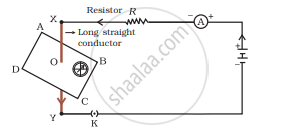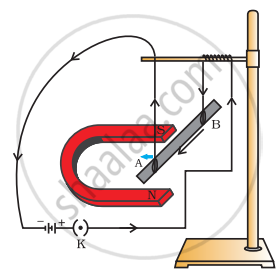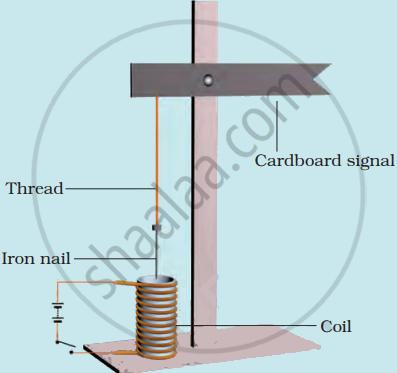Advertisements
Advertisements
Question
In the Activity shown below, how do we think the displacement of rod AB will be affected if
- current in rod AB is increased
- a stronger horse-shoe magnet is used
- length of the rod AB is increased?
|
Solution
A current-carrying conductor placed in a magnetic field experiences a force. The magnitude of force increases with the amount of current, strength of the magnetic field, and the length of the conductor. Hence, the magnetic force exerted on rod AB and its deflection will increase if,
- The current in rod AB is increased.
- A stronger horse-shoe magnet is used.
- Length of rod AB is increased.
APPEARS IN
RELATED QUESTIONS
An electromagnet does not attract a piece of iron.
An electric bell has an electromagnet.
Which effect of current can be utilised in detecting a current carrying wire concealed in a wall?
Name the scientist who discovered the magnetic effect of current.
Fill in the following blank with suitable words:
If a coil is viewed from one end and the current flows in an anticlockwise direction, then this end is a ........... pole.
What is Maxwell's corkscrew rule? For what purpose is if used?
(b) State whether the following statements are true or false:
(i) Magnetic poles exist in pairs.
(ii) Global warming is a desirable aspect of the intensified greenhouse effect.
(ii) Global warming is a desirable aspect of the intensified greenhouse effect.
Name any two appliances which works on the phenomenon of magnetic effect of electric current.
A soft iron bar is introduced inside the current-carrying solenoid. The magnetic field inside the solenoid ____________.
If the key in the given arrangement is taken out (the circuit is made open) and magnetic field lines are drawn over the horizontal plane ABCD, the lines are ____________.

Magnetic effect of current was discovered by ______.
Paheli does not have a night lamp in her room. She covered the bulb of her room with a towel at the night to get dim light. Has she taken the right step? Give one reason to justify your answer.
Why do we cover plug pinholes which are within the reach of children with sellotape or a plastic cover when not in use?
______ are also used to remove splinters of steel or iron in hospitals dealing with eye injuries.
A student was asked to perform an experiment to study the force on a current carrying conductor in a magnetic field. He took a small aluminium rod AB, a strong horse shoe magnet, some connecting wires, a battery and a switch and connected them as shown. He observed that on passing current, the rod gets displaced. On reversing the direction of current, the direction of displacement also gets reversed. On the basis of your understanding of this phenomenon, answer the following questions:

- Why does the rod get displaced on passing current through it?
- State the rule that determines the direction of the force on the conductor AB.
-
- If the U-shaped magnet is held vertically and the aluminium rod is suspended horizontally with its end B towards due north, then on passing current through the rod from B to A as shown, in which direction will the rod be displaced?
- Name any two devices that use current carrying conductors and magnetic fields.
OR
Draw the pattern of magnetic field lines produced around a current carrying straight conductor held vertically on a horizontal cardboard. Indicate the direction of the field lines as well as the direction of current flowing through the conductor.
As shown in the diagram an aluminium rod 'AB' is suspended horizontally between the two poles of a strong horse shoe magnet in such a way that the axis of rod is horizontal and the direction of the magnetic field is vertically upward. The rod is connected in series with a battery and a key.

State giving reason:
- What is observed when a current is passed through the aluminium rod from end B to end A?
- What change is observed in a situation in which the axis of the rod 'AB' is moved and aligned parallel to the magnetic field and current is passed in the rod in the same direction?
Using an electromagnet, you can make a working model of a railway signal as shown in figure.

Make four electromagnets with 20, 40, 60 and 80 turns. Connect them one by one to a battery of 2 cells. Bring the electromagnet near a box of pins. Count the number of pins attracted by it. Compare the strengths of the electromagnets.
